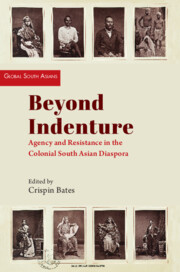Book contents
- Frontmatter
- Dedication
- Contents
- List of Figures and Tables
- Acknowledgements
- Introduction
- I Agency and Resistance
- 1 Negotiating Power in Colonial Natal: Indentured Migrants in Natal, 1860–1911
- 2 Stewed Plums, Baked Porridge and Flavoured Tea: Poisoning by Indian Domestic Servants in Colonial Natal
- 3 Labour Resistance in Indenture Plantations in the Assam Valley
- 4 A Forgotten Narrative of the Satyagraha Campaign: The Treatment of Prisoners between 1907 and 1914
- 5 Toilers across the Seas: Racial Discrimination and Political Assertion among Sikhs in Canada
- II Remigration
- 6 The Remigration of Hindostanis from Surinam to India, 1878–1921
- 7 Not So Anchored: The Remigration of Indians within the Caribbean Region
- 8 On the Move: Remigration in the Indian Ocean, 1850–1906
- III Gender and Family
- 9 Intimate Lives on Rubber Plantations: The Textures of Indian Coolie Relations in British Malaya
- 10 Labouring under the Law: Exploring the Agency of Indian Women under Indenture in Colonial Natal, 1860–1911
- 11 Gujarati ‘Passenger Indians’ in the Eastern Cape since 1900: Business, Mobility, Caste and Community
- 12 The Eurasian Female Workforce and Imperial Britain: Harnessing Domestic Labour by People of Mixed Racial Descent
- IV Legacies
- 13 After the Long March: Colonial-Era ‘Relief’ for Burma Indian Evacuees in Visakhapatnam District, 1942–1948
- 14 Opposing the Group Areas Act and Resisting Forced Displacement in Durban, South Africa
- 15 Indo-Fijians: From Agency to Abjection
- 16 New and Old Diasporas of South South Asia: Sri Lanka and Cyber-Nationalism in Malaysia
- About the Contributors
- Index
13 - After the Long March: Colonial-Era ‘Relief’ for Burma Indian Evacuees in Visakhapatnam District, 1942–1948
Published online by Cambridge University Press: 31 December 2023
- Frontmatter
- Dedication
- Contents
- List of Figures and Tables
- Acknowledgements
- Introduction
- I Agency and Resistance
- 1 Negotiating Power in Colonial Natal: Indentured Migrants in Natal, 1860–1911
- 2 Stewed Plums, Baked Porridge and Flavoured Tea: Poisoning by Indian Domestic Servants in Colonial Natal
- 3 Labour Resistance in Indenture Plantations in the Assam Valley
- 4 A Forgotten Narrative of the Satyagraha Campaign: The Treatment of Prisoners between 1907 and 1914
- 5 Toilers across the Seas: Racial Discrimination and Political Assertion among Sikhs in Canada
- II Remigration
- 6 The Remigration of Hindostanis from Surinam to India, 1878–1921
- 7 Not So Anchored: The Remigration of Indians within the Caribbean Region
- 8 On the Move: Remigration in the Indian Ocean, 1850–1906
- III Gender and Family
- 9 Intimate Lives on Rubber Plantations: The Textures of Indian Coolie Relations in British Malaya
- 10 Labouring under the Law: Exploring the Agency of Indian Women under Indenture in Colonial Natal, 1860–1911
- 11 Gujarati ‘Passenger Indians’ in the Eastern Cape since 1900: Business, Mobility, Caste and Community
- 12 The Eurasian Female Workforce and Imperial Britain: Harnessing Domestic Labour by People of Mixed Racial Descent
- IV Legacies
- 13 After the Long March: Colonial-Era ‘Relief’ for Burma Indian Evacuees in Visakhapatnam District, 1942–1948
- 14 Opposing the Group Areas Act and Resisting Forced Displacement in Durban, South Africa
- 15 Indo-Fijians: From Agency to Abjection
- 16 New and Old Diasporas of South South Asia: Sri Lanka and Cyber-Nationalism in Malaysia
- About the Contributors
- Index
Summary
For diasporic Indian communities living in Burma (present-day Myanmar), the Second World War was a period of massive upheaval. As the Japanese military bombed the colonial capital of Rangoon (present-day Yangon) in December 1941 and conquered large swaths of Burma by the spring of 1942, many Burma Indians fled across the Bay of Bengal by steamship, aircraft or on foot. They, along with much smaller numbers of Anglo-Indians, Anglo-Burmese and Europeans, reached British India’s borders, numbering approximately 500,000 in total. Upon their arrival in India, these displaced people became the subject of large-scale relief projects developed by the government, which included limited efforts to employ ‘skilled’ workers, labour projects to absorb ‘unskilled’ evacuees and the issuance of repayable loans. The final stage of colonial relief for the Burma evacuees came after 1945, when the government cobbled together a repatriation programme to assist those who wished to return to Burma after the war. By providing an overview of these policies, this chapter will track the colonial administration’s changing responses to Burma Indian populations as they went from ‘migrants’ to ‘evacuees’ to ‘repatriates’ during the 1940s. Drawing on historical evidence from Visakhapatnam district, which received the largest number of Burma Indian evacuees of any district in India during the war, the chapter also provides a brief discussion of evacuees’ responses to government-run aid programmes.
In recent years, scholars have begun to reappraise the impact of the Second World War on South Asia. One of the outcomes of this new research has been to see the war years not only as the lead-up to national independence, but also as a period that caused massive disruption and social and political change throughout Asia. Within this broader literature, a growing number of authors are now examining the effects that the war had on migratory and diasporic Asian communities. Scholarship from the 1970s onward on Indian communities in Burma, for instance, has presented the regional onset of war and the evacuation of Burma as the start of a precipitous decline for people of Indian descent. For instance, Nalini Ranjan Chakravarti, a Burma Indian Civil Service (ICS) member, wrote of the period from 1942 onwards as ‘the end of Indian interests in Burma’.
- Type
- Chapter
- Information
- Beyond IndentureAgency and Resistance in the Colonial South Asian Diaspora, pp. 295 - 314Publisher: Cambridge University PressPrint publication year: 2024



